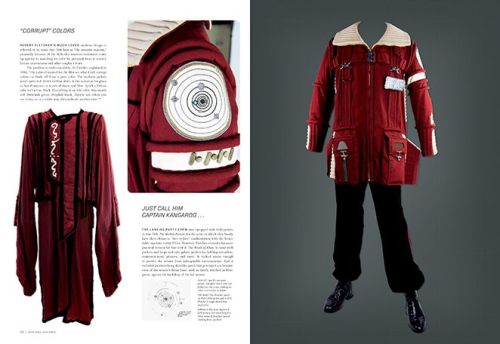The Space Shuttle Discovery Lands At Kennedy Space Center After A 13-day Mission To The ISS, 28 March

The Space Shuttle Discovery lands at Kennedy Space Center after a 13-day mission to the ISS, 28 March 2009. (NASA)
More Posts from Pugmum1 and Others




They Boldly Went has teamed up with Insight Editions to give away a copy of Star Trek Costumes: Five Decades Of Fashion From The Final Frontier , an exhaustive look at the design and process behind our favorite science fiction franchise’s couture. Packed with detailed photographs, rarely-see publicity images and anecdotes from the designers and craftsmen that put them together, this deluxe 256-page hardcover is the sort of thing that I’ve been dreaming about.
All you have to do to enter is reblog this post and sign up for their mailing list before 11:59PM EDT on Friday, October 16. They’ll pick a winner and we’ll post about it on Monday or Tuesday of next week. Good luck!
Please note that this giveaway is limited to North America only.

What’s Up for September?

Stargazing and looking up into the night sky is always a fun thing to do. This month, it will be especially exciting because there will be a total eclipse of a supermoon, plus the opportunity to see planets and the late-summer Milky Way!
What is a supermoon?

A supermoon is a new or full moon that occurs when it is at, or near its closest approach to Earth in a given orbit. There are usually 4 to 6 supermoons every year.
Observers can view the total eclipse on September 27, starting at 10:11 p.m. EDT until 11:23 p.m. This event will be visible in North and South America, as well as Europe and Africa. So make sure to mark your calendars!

This month, you will also be able to see the planets! Look for Mercury, Saturn, Pluto and Neptune in the evening sky. Uranus and Neptune at midnight, and Venus, Mars and Jupiter in the pre-dawn sky.

Finally, if you’re able to escape to a dark location, you might be able to see a great view of our Milky Way!
So, make sure to get outside this month and take a look at everything our night sky has to offer.

Make sure to follow us on Tumblr for your regular dose of space: http://nasa.tumblr.com
R2D2 being the cutest robot in the universe.

Yes he did!
If only it were this easy, lol! "Can’t find a bottle opener? Here’s #ProbablyTheBest way to pour your next beer!"
Exciting NASA news
… as if there’s not been some of that already this week.

(Image credit: NASA/JPL)
It seems that NASA’s slated to select two proposals for their Discovery program missions.
A “Discovery” mission at NASA is generally a smaller mission that happens very quickly. Something like the Curiosity rover or the Cassini-Huygens mission aren’t Discovery program missions, those are called “Flagship” missions.
NASA’s incredible Dawn mission is a Discovery mission.
Right now the five missions under consideration are:
- VERITAS (Venus Emissivity, Radio Science, InSAR Topography and Spectroscopy): Basically a mission that would orbit Venus (a planet deserving to be visited again) and map its surface with high resolution radar.
- Psyche: This mission would explore a huge, metal-rich asteroid in the asteroid belt. Important and potentially influential mission (there are lots of entrepreneurs looking for metal-rich asteroids to mine in the near future).
- Lucy: This mission would explore a series of “Trojan” asteroids, basically asteroids that trail behind Jupiter.
- NEOCam: This would search for dangerous near-Earth asteroids.
- DAVINCI (Deep Atmosphere Venus Investigation of Noble gases, Chemistry, and Imaging): As you might guess from its name, this spacecraft would descend through the Venusian atmosphere, studying it as it goes down.
If the rumors I’ve heard are true, it’s possible NASA might be able to select two missions from this excellent pile.
What are your picks?






Comets have two tails.
There are two types of comet tails: dust and gas ion.
A dust tail contains small, solid particles that are about the same size found in cigarette smoke. This tail forms because sunlight pushes on these small particles, gently shoving them away from the comet’s nucleus. Because the pressure from sunlight is relatively weak, the dust particles end up forming a diffuse, curved tail.
A gas ion tail forms when ultraviolet sunlight rips one or more electrons from gas atoms in the coma, making them into ions (a process called ionization). The solar wind then carries these ions straight outward away from the Sun. The resulting tail is straighter and narrower. Both types of tails may extend millions of kilometers into space. As a comet heads away from the Sun, its tail dissipates, its coma disappears, and the matter contained in its nucleus freezes into a rock-like material.
Comets don’t like the sun.
Comets lose a lot of mass when they go by the Sun. A lot: some shed hundreds of tons of material per second. That’s actually a small fraction of the mass of a comet, but given time, and lots of solar passes, it adds up. Every comet we see is slowly dissolving in space. Eventually even the mighty Comet Halley will be gone, broken down into a swarm of rocks, gravel, and dust once its gas is gone.
The Hornblower catamaran operating at the base of Niagra's Horseshoe Falls in #Canada #travel #waterfall #6secondpostcard
Cute little buggy! "Crossbreeding a spider and a car results into this new automotive species 😝 [made by swincar.fr]"
-
 visitingstatuee reblogged this · 9 years ago
visitingstatuee reblogged this · 9 years ago -
 sasusprite reblogged this · 9 years ago
sasusprite reblogged this · 9 years ago -
 fromacertainpointofview liked this · 9 years ago
fromacertainpointofview liked this · 9 years ago -
 sparequarter liked this · 9 years ago
sparequarter liked this · 9 years ago -
 pugmum1 reblogged this · 9 years ago
pugmum1 reblogged this · 9 years ago -
 pugmum1 liked this · 9 years ago
pugmum1 liked this · 9 years ago -
 lightthiscandle liked this · 9 years ago
lightthiscandle liked this · 9 years ago -
 starpippinconquerstheuniverse liked this · 9 years ago
starpippinconquerstheuniverse liked this · 9 years ago -
 syphiliticinsanity reblogged this · 9 years ago
syphiliticinsanity reblogged this · 9 years ago -
 lakelander liked this · 9 years ago
lakelander liked this · 9 years ago -
 lunar0dust reblogged this · 9 years ago
lunar0dust reblogged this · 9 years ago -
 vatnik-ivan liked this · 9 years ago
vatnik-ivan liked this · 9 years ago -
 apatheticmango reblogged this · 9 years ago
apatheticmango reblogged this · 9 years ago -
 apatheticmango liked this · 9 years ago
apatheticmango liked this · 9 years ago -
 francispoole liked this · 9 years ago
francispoole liked this · 9 years ago -
 mikeg16beaner liked this · 9 years ago
mikeg16beaner liked this · 9 years ago -
 secretblog101 reblogged this · 9 years ago
secretblog101 reblogged this · 9 years ago -
 secretblog101 liked this · 9 years ago
secretblog101 liked this · 9 years ago -
 alb-8 reblogged this · 9 years ago
alb-8 reblogged this · 9 years ago -
 to-hell-for-heavens-sake liked this · 9 years ago
to-hell-for-heavens-sake liked this · 9 years ago -
 los7817 liked this · 9 years ago
los7817 liked this · 9 years ago -
 callsign-stubborn reblogged this · 9 years ago
callsign-stubborn reblogged this · 9 years ago -
 humanoidhistory reblogged this · 9 years ago
humanoidhistory reblogged this · 9 years ago